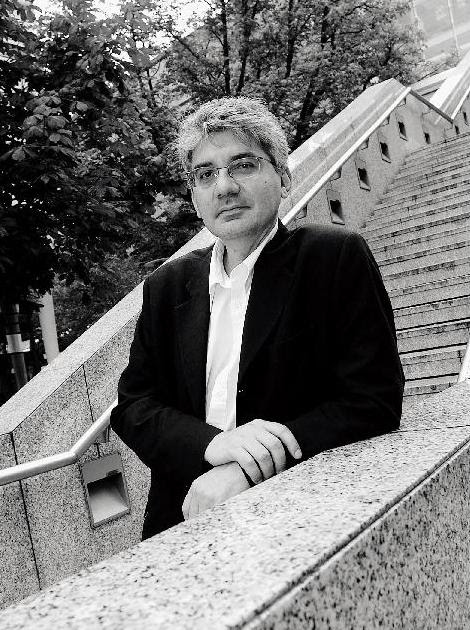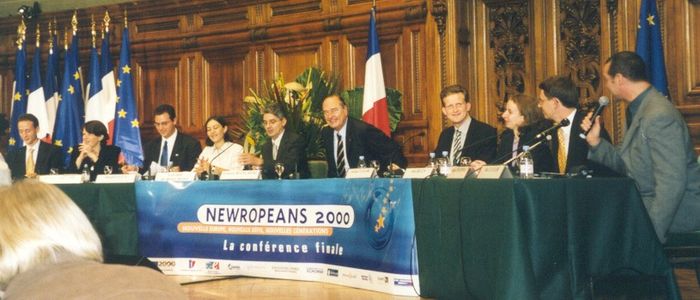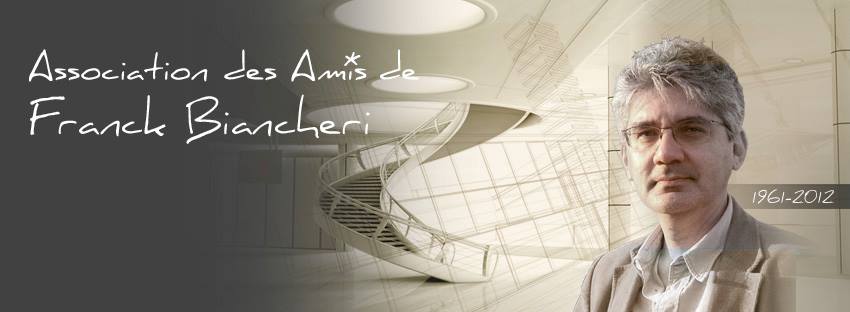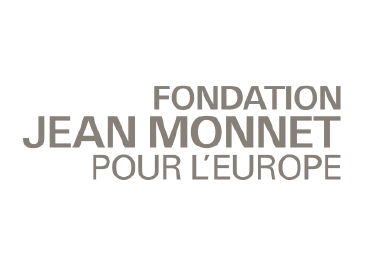I could witness how Jacques Chirac was a particularly effective communicator in this type of exercise. On the evening of 7 April, however, to convince, he will also need to have a clear vision of the EU he wants to see emerge after the adoption of the Constitution. (Franck Biancheri, 01/04/2005)
French President Jacques Chirac with Franck Biancheri at the final conference of the Newropeans 2000 Congress on 7 October 2000 in the Grand Amphithéatre de la Sorbonne (Paris)
October 7th, 2000, Jacques Chirac and Franck Biancheri sat side by side with the 2000 European students gathered in the great amphitheatre of the Sorbonne in Paris, on the occasion of the Congress organised by Prometheus-Europe “Newropeans 2000: New Europe, New Challenges, New Generations”. The French President had come to close the three days of the congress with Franck Biancheri and had enjoyed and successfully participated in a question and answer session that lasted almost an hour.
2005, as part of the referendum campaign on the European Constitution, Jacques Chirac agreed to participate in a televised debate on the Constitution with young people. For Franck Biancheri, Jacques Chirac’s personality as an “effective communicator” was no longer enough to convince young generations “who had become very critical of the community project…”.
We are republishing here an open letter that he signed on the eve of this debate for the attention of the French President.
The President, Europe and Youth
As the organiser of the Newropeans 2000 congress “New Europe, New Challenges, New Generations” which, in October 2000, welcomed the President of the French Republic to the Grand Amphitheatre de la Sorbonne, I had the privilege of directly observing Jacques Chirac in action, in front of a young audience (2,000 students from all over Europe), on the European theme.
Having also had the opportunity to participate twice in debates at the Elysée between President François Mitterrand and young Europeans from Aegean-Europe, first at a lunch that allowed the funding of the Erasmus programme to be released in March 1987, then at the end of a congress of European and African students in May 1988, I was able to form some opinions on the effectiveness of a “French-Youth President” dialogue on European issues.
So, on the eve of this meeting, which is presented as very important since it constitutes the entry of the President of the French Republic into the French referendum debate on the European Constitution, I would like to share these analyses with the readers of Newropeans-Magazine.
The live television broadcast of such a meeting naturally modifies several parameters in relation to this type of debate in the context of a congress or a smaller committee; however, certain elements seem to me intangible.
Students only or a larger group, including young people outside the university curriculum? If they are students, Europe as a project for a positive future will pass more easily than if it is young people who have had to stop studying earlier, but care must be taken not to cite Erasmus once again as an example of the EU’s action for young people and the future. Why? because for these young people, Erasmus is starting to look “old” because it dates back 18 years, when these young people were just born!
In this respect, to convince, the President should be able to launch a new approach for the future, dealing both with a more integrated training of European elites (the “airbus university” for example, proposed by Boris Walbaum and the Belles Feuilles group), and with the democratization of exchanges, which are shorter but more numerous, for most students.
Because, and let us make no mistake about it, if they are not young “caricatured” people (for example, recruited from the “Yes-Yes” youth movements, who must now represent less than 1% of a generation), they will have opinions on what directly concerns them (studies, employment, etc.) and disturbing questions on all subjects. I remember Jacques Chirac asking me “Where did you find these young people because they are excellent? “after a two-hour question and answer session at the Sorbonne. My answer had been simple: “where they are, in nearly 200 universities in more than 25 European countries“.
If the selection is also representative of French (and perhaps European) youth, he knows that the quality of the debate will be there. Otherwise, it will be a futile, even negative exercise for the Constitution.
Especially since today, unlike five years ago, the younger generations have become very critical of the current Community project. This is reflected in the surveys and I see it every day in the debates I have in the field in France and elsewhere. They seem to expect a vision of the future that has not been provided by anyone in the political class so far and tend, given their age, to be very demanding in this area, because in the end, the future is where they will spend most of their lives…
Succeeding in this “grand oral” discussion on Europe and the Constitution, in front of these young people, can thus be the ideal opportunity to revitalise the credibility of the Yes, by drawing the main lines of the EU that can be built tomorrow. For this reason, we must not hesitate to be critical of the present, and of the limits of the Constitution, for want of not really being in tune with these same young people… and risk reinforcing the idea of a gap between the expectation of Europe and its realization…
I could witness how Jacques Chirac was a particularly effective communicator in this type of exercise. On the evening of 7 April, to convince, however, it will also be necessary to have a clear vision of the EU that he wants to see emerge after the adoption of the Constitution.
Franck Biancheri,
01/04/2005 -> Original French: Le Président, l’Europe et les Jeunes






